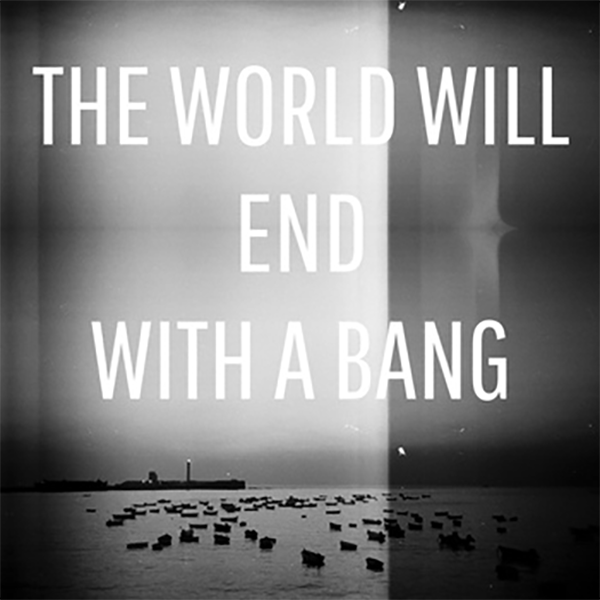
by Ian Mann
June 12, 2014
/ ALBUM
There is much to enjoy in the way that Mapp is expanding the sound of the bass guitar for the twenty first century.
Jon Mapp
“The World Will End With A Bang”
(We Are K Records WERK 0002)
Jon Mapp is a London based bass guitar experimenter. Specialising exclusively on the electric instrument he augments his sound with a simple wooden stomp box and a laptop on which he loops and treats his sound to create layered soundscapes, the results being fascinating and sometimes disturbing.
Borrowing its title from T.S. Eliot “The World Will End With a Bang” is Mapp’s début solo album and features his playing exclusively. It is a concept album of sorts, following the tale of “an unnamed journeyman in an imagined surreal nightmarish adventure akin to a cross between Dante’s Inferno, Twin Peaks and Watership Down” - so says the press release. “This record has a story. With a beginning and end” adds the CD insert, somewhat cryptically.
The story is an oblique one, unwritten and existing only through the highly descriptive track titles, many of which were coined before the music that illustrates them. Mapp describes each of the nine pieces as a chapter in the overall story. The title suggest a post apocalyptic vision, something emphasised by the brief but bleak verse on the CD’s back cover and the cryptic, almost impenetrable descriptions of each piece that accompany the press release.
A former student of the bass at both Trinity and the London College of Music Mapp’s influences are broad from jazz (Kenny Wheeler), folk (Nick Drake) and electronica (Aphex Twin) to classical (Messiaen). He has also played in a number of world and roots outfits and the cumulative effect has given him a very open minded approach to composition and improvisation.
Opener “The Foxes Know All About You” features melodic guitar like chording above glitchy odd meter rhythms presumably created on the stomp box and processed through the lap top.
The title track features multi layered bass guitar parts, the high register melodic lines again sounding seriously guitar like. Given that the music was recorded in real time, essentially live, this is an impressive example of in the moment soundscaping.
A self confessed computer nerd Mapp adds layers of electronica to create a suitably sinister atmosphere for “Journey Into The Woods”, the air of unease enhanced by his deeply resonant work in the bass guitar’s lower register. But there are more melodic moments too, thanks to Mapp’s nimble high register playing, a legacy of his early love of Jaco Pastorius.
With its simple and engaging melody and carefully latticed bass guitar lines “Fanfare For The Owls” is positively beautiful. It’s thematically linked to the following “You Will Know When”, another piece that explores (albeit briefly) the range of “pure” bass guitar sounds.
The mood shifts back to the sinister and disturbing on “In the midst of the Chaos, a Rat Feeds Her Pup”, this in part largely due to the scratchy electronic sounds that form the backbone of the piece and the clangorous, distorted bass guitar sounds Mapp adds towards the end. Elsewhere there are examples of Mapp’s admirable melodicism, despite the apocalyptic trappings and sometimes sombre atmosphere the album overall is more accessible than one might expect.
“From the Rocks Comes the Trees” represents some kind of rebirth but this is overshadowed by the air of impending doom. Mapp’s playing embraces a variety of moods and timbres, he’s an imaginative and adventurous soloist with an advanced knowledge of harmony, his playing dexterous but never gratuitously flashy.
“Meeting The Follower” is a brief melodic episode for untreated bass guitar which is followed by the concluding piece, “The Bang”. This is based around an insistent electronic bleep, that seems to threaten that, in the context of the story, time is running out. Nonetheless Mapp is able to stretch lines of delicate melodic tracery around it as the “Figure” of his narrative remains serene in the face of his impending destruction, something that comes swiftly as the piece suddenly changes direction with heavily fuzzed up and distorted bass guitar replicating the explosive final blast.
This is an album that has met with mixed reactions. Writing for London Jazz News Rob Edgar was impressed with Mapp’s spirit of harmonic adventure and technical skill. Other commentators have dismissed it as merely pretentious and self indulgent. I find myself falling somewhere between these two views, I find much to admire and enjoy in Mapp’s playing and writing, his technical ability is beyond question, his compositional ideas are interesting and his treatment of sound both skilled and intriguing. The story itself I found distracting, it’s too vague and sketchy and opens Mapp up for the kind of criticisms that his detractors have levelled at him.
However there is much to enjoy in the way that Mapp is expanding the sound of the bass guitar for the twenty first century and it’s an intriguing coincidence that his namesake Chris Mapp, absolutely no relation, is doing something very similar up the road in Birmingham.